- Home
- Beverly Cleary
Ramona the Pest Page 2
Ramona the Pest Read online
Page 2
By now all the children were crowding around the door to see what had happened to their teacher. “I’m so sorry,” said Miss Binney. “It’s all my fault. I should have used different words.”
“That’s all right,” said Ramona, ashamed to have the class see that she was not going to get a present after all.
“All right, class,” said Miss Binney briskly. “Let’s go outside and play Gray Duck. You, too, Ramona.”
Gray Duck turned out to be an easy game, and Ramona’s spirits recovered quickly from her disappointment. The class formed a circle, and the person who was “it” tagged someone who had to chase him around the circle. If “it” was caught before he got back to the empty space in the circle, he had to go into the center of the circle, which was called the mush pot, and the person who caught him became “it.”
Ramona tried to stand next to the girl with the springy curls, but instead she found herself beside Howie. “I thought you were going to get a present,” gloated Howie.
Ramona merely scowled and made a face at Howie, who was “it,” but quickly landed in the mush pot because his new jeans were so stiff they slowed him down. “Look at Howie in the mush pot!” crowed Ramona.
Howie looked as if he were about to cry, which Ramona thought was silly of him. Only a baby would cry in the mush pot. Me, me, somebody tag me, thought Ramona, jumping up and down. She longed for a turn to run around the circle. Susan was jumping up and down, too, and her curls bobbed enticingly.
At last Ramona felt a tap on her shoulder. Her turn had come to run around the circle! She ran as fast as she could to catch up with the sneakers pounding on the asphalt ahead of her. The boing-boing curls were on the other side of the circle. Ramona was coming closer to them. She put out her hand. She took hold of a curl, a thick, springy curl—
“Yow!” screamed the owner of the curls.
Startled, Ramona let go. She was so surprised by the scream that she forgot to watch Susan’s curl spring back.
Susan clutched her curls with one hand and pointed at Ramona with the other. “That girl pulled my hair! That girl pulled my hair! Ow-ow-ow.” Ramona felt that Susan did not have to be so touchy. She had not meant to hurt her. She only wanted to touch that beautiful, springy hair that was so different from her own straight brown hair.
“Ow-ow-ow!” shrieked Susan, the center of everyone’s attention.
“Baby,” said Ramona.
“Ramona,” said Miss Binney, “in our kindergarten we do not pull hair.”
“Susan doesn’t have to be such a baby,” said Ramona.
“You may go sit on the bench outside the door while the rest of us play our game,” Miss Binney told Ramona.
Ramona did not want to sit on any bench. She wanted to play Gray Duck with the rest of the class. “No,” said Ramona, preparing to make a great big noisy fuss. “I won’t.”
Susan stopped shrieking. A terrible silence fell over the playground. Everyone stared at Ramona in such a way that she almost felt as if she were beginning to shrink. Nothing like this had ever happened to her before.
“Ramona,” said Miss Binney quietly. “Go sit on the bench.”
Without another word Ramona walked across the playground and sat down on the bench by the door of the kindergarten. The game of Gray Duck continued without her, but the class had not forgotten her. Howie grinned in her direction. Susan continued to look injured. Some laughed and pointed at Ramona. Others, particularly Davy, looked worried, as if they had not known such a terrible punishment could be given in kindergarten.
Ramona swung her feet and pretended to be watching some workmen who were building a new market across the street. In spite of the misunderstanding about the present, she wanted so much to be loved by her pretty new teacher. Tears came into Ramona’s eyes, but she would not cry. Nobody was going to call Ramona Quimby a crybaby. Never.
Next door to the kindergarten two little girls, about two and four years old, peered solemnly through the fence at Ramona. “See that girl,” said the older girl to her little sister. “She’s sitting there because she’s been bad.” The two-year-old looked awed to be in the presence of such wickedness. Ramona stared at the ground, she felt so ashamed.
When the game ended, the class filed past Ramona into the kindergarten. “You may come in now, Ramona,” said Miss Binney pleasantly.
Ramona slid off the bench and followed the others. Even though she was not loved, she was forgiven, and that helped. She hoped that learning to read and write came next.
Inside Miss Binney announced that the time had come to rest. This news was another disappointment to Ramona, who felt that anyone who went to kindergarten was too old to rest. Miss Binney gave each child a mat on which there was a picture that matched the picture on his cupboard door and told him where to spread his mat on the floor. When all twenty-nine children were lying down they did not rest. They popped up to see what others were doing. They wiggled. They whispered. They coughed. They asked, “How much longer do we have to rest?”
“Sh-h,” said Miss Binney in a soft, quiet, sleepy voice. “The person who rests most quietly will get to be the wake-up fairy.”
“What’s the wake-up fairy?” demanded Howie, bobbing up.
“Sh-h,” whispered Miss Binney. “The wake-up fairy tiptoes around and wakes up the class with a magic wand. Whoever is the fairy wakes up the quietest resters first.”
Ramona made up her mind that she would get to be the wake-up fairy, and then Miss Binney would know she was not so bad after all. She lay flat on her back with her hands tight to her sides. The mat was thin and the floor was hard, but Ramona did not wiggle. She was sure she must be the best rester in the class, because she could hear others squirming around on their mats. Just to show Miss Binney she really and truly was resting she gave one little snore, not a loud snore but a delicate snore, to prove what a good rester she was.
A scatter of giggles rose from the class, followed by several snores, less delicate than Ramona’s. They led to more and more, less and less delicate snores until everyone was snoring except the few who did not know how to snore. They were giggling.
Miss Binney clapped her hands and spoke in a voice that was no longer soft, quiet, and sleepy. “All right, boys and girls!” she said. “This is enough! We do not snore or giggle during rest time.”
“Ramona started it,” said Howie.
Ramona sat up and scowled at Howie. “Tattletale,” she said in a voice of scorn. Across Howie she saw that Susan was lying quietly with her beautiful curls spread out on her mat and her eyes screwed tight shut.
“Well, you did,” said Howie.
“Children!” Miss Binney’s voice was sharp. “We must rest so that we will not be tired when our mothers come to take us home.”
“Is your mother coming to take you home?” Howie asked Miss Binney. Ramona had been wondering the same thing.
“That’s enough, Howie!” Miss Binney spoke the way mothers sometimes speak just before dinnertime. In a moment she was back to her soft, sleepy voice. “I like the way Susan is resting so quietly,” she said. “Susan, you may be the wake-up fairy and tap the boys and girls with this wand to wake them up.”
The magic wand turned out to be nothing but an everyday yardstick. Ramona lay quietly, but her efforts were of no use. Susan with her curls bouncing about her shoulders tapped Ramona last. It’s not fair, Ramona thought. She was not the worst rester in the class. Howie was much worse.
The rest of the morning went quickly. The class was allowed to explore the paints and the toys, and those who wanted to were allowed to draw with their new crayons. They did not, however, learn to read and write, but Ramona cheered up when Miss Binney explained that anyone who had anything to share with the class could bring it to school the next day for Show and Tell. Ramona was glad when the bell finally rang and she saw her mother waiting for her outside the fence. Mrs. Kemp and Willa Jean were waiting for Howie, too, and the five started home together.
Right away How
ie said, “Ramona got benched, and she’s the worst rester in the class.”
After all that had happened that morning, Ramona found this too much. “Why don’t you shut up?” she yelled at Howie just before she hit him.
Mrs. Quimby seized Ramona by the hand and dragged her away from Howie. “Now Ramona,” she said, and her voice was firm, “this is no way to behave on your first day of school.”
“Poor little girl,” said Mrs. Kemp. “She’s worn out.”
Nothing infuriated Ramona more than having a grown-up say, as if she could not hear, that she was worn out. “I’m not worn out!” she shrieked.
“She got plenty of rest while she was benched,” said Howie.
“Now Howie, you stay out of this,” said Mrs. Kemp. Then to change the subject, she asked her son, “How do you like kindergarten?”
“Oh—I guess it’s all right,” said Howie without enthusiasm. “They don’t have any dirt to dig in or tricycles to ride.”
“And what about you, Ramona?” asked Mrs. Quimby. “Did you like kindergarten?”
Ramona considered. Kindergarten had not turned out as she had expected. Still, even though she had not been given a present and Miss Binney did not love her, she had liked being with boys and girls her own age. She liked singing the song about the dawnzer and having her own little cupboard. “I didn’t like it as much as I thought I would,” she answered honestly, “but maybe it will get better when we have Show and Tell.”
2
Show and Tell
Ramona looked forward to many things—her first loose tooth, riding a bicycle instead of a tricycle, wearing lipstick like her mother—but most of all she looked forward to Show and Tell. For years Ramona had watched her sister Beezus leave for school with a doll, a book, or a pretty leaf to share with her class. She had watched Beezus’s friend Henry Huggins carry mysterious, lumpy packages past her house on his way to school. She had listened to Beezus talk about the interesting things her class brought to school—turtles, ballpoint pens that wrote in three different colors, a live clam in a jar of sand and seawater.
Now at last the time had come for Ramona to show and tell. “What are you going to take to show your class?” she asked Beezus, hoping for an idea for herself.
“Nothing,” said Beezus, and went on to explain. “Along about the third grade you begin to outgrow Show and Tell. By the fifth grade it’s all right to take something really unusual like somebody’s pickled appendix or something to do with social studies. An old piece of fur when you study fur traders would be all right. Or if something really exciting happened like your house burning down, it would be all right to tell about that. But in the fifth grade you don’t take an old doll or a toy fire engine to school. And you don’t call it Show and Tell by then. You just let the teacher know you have something interesting.”
Ramona was not discouraged. She was used to Beezus’s growing out of things as she grew into them. She rummaged around in her toy box and finally dragged out her favorite doll, the doll with the hair that could really be washed. “I’m going to take Chevrolet,” she told Beezus.
“Nobody names a doll Chevrolet,” said Beezus, whose dolls had names like Sandra or Patty.
“I do,” Ramona answered. “I think Chevrolet is the most beautiful name in the world.”
“Well, she’s a horrid-looking doll,” said Beezus. “Her hair is green. Besides, you don’t play with her.”
“I wash her hair,” said Ramona loyally, “and the only reason what’s left of her hair looks sort of green is that I tried to blue it like Howie’s grandmother, who has her hair blued at the beauty shop. Mama said putting bluing on yellow hair turned it green. Anyway, I think it’s pretty.”
When the time finally came to start to school, Ramona was disappointed once more to see Mrs. Kemp approaching with Howie and little Willa Jean. “Mama, come on,” begged Ramona, dragging at her mother’s hand, but her mother waited until the Kemps had caught up. Willa Jean was even sloppier this morning. There were crumbs on the front of her sweater, and she was drinking apple juice out of a nursing bottle. Willa Jean dropped the bottle when she saw Chevrolet and sat there with apple juice dribbling down her chin while she stared at Ramona’s doll.
“Ramona is taking her doll to school for Show and Tell,” said Mrs. Quimby.
Howie looked worried. “I don’t have anything for Show and Tell,” he said.
“That’s all right, Howie,” said Mrs. Quimby. “Miss Binney doesn’t expect you to take something every day.”
“I want to take something,” said Howie.
“My goodness, Howie,” said his mother. “What if twenty-nine children each brought something. Miss Binney wouldn’t have time to teach you anything.”
“She’s taking something.” Howie pointed to Ramona.
There was something familiar about the way Howie was behaving. Ramona pulled at her mother’s hand. “Come on, Mama.”
“Ramona, I think it would be nice if you ran in the house and found something to lend Howie to take to school,” said Mrs. Quimby.
Ramona did not think this idea was nice at all, but she recognized that lending Howie something might be faster than arguing with him. She ran into the house where she snatched up the first thing she saw—a stuffed rabbit that had already been given hard wear before the cat had adopted it as a sort of practice gopher. The cat liked to chew the rabbit’s tail, carry it around in his mouth, or lie down and kick it with his hind feet.
When Ramona thrust the rabbit into Howie’s hand, Mrs. Kemp said, “Say thank you, Howie.”
“It’s just an old beat-up bunny,” said Howie scornfully. When his mother wasn’t looking, he handed the rabbit to Willa Jean, who dropped her apple juice, seized the rabbit, and began to chew its tail.
Just like our cat, thought Ramona, as the group proceeded toward school.
“Don’t forget Ramona’s bunny,” said Mrs. Kemp, when they reached the kindergarten playground.
“I don’t want her old bunny,” said Howie.
“Now Howie,” said his mother. “Ramona was kind enough to share her bunny so you be nice.” To Mrs. Quimby she said, as if Howie could not hear, “Howie needs to learn manners.”
Share! Ramona had learned about sharing in nursery school, where she either had to share something of her own that she did not want to share or she had to share something that belonged to someone else that she did not want to share either. “That’s all right, Howie,” she said. “You don’t have to share my rabbit.”
Howie looked grateful, but his mother thrust the rabbit into his hands anyway.
At the beginning, on that second day of kindergarten, Ramona felt shy because she was not sure what Miss Binney would think about a girl who had been made to sit on the bench. But Miss Binney smiled, and said, “Good morning, Ramona,” and seemed to have forgotten all about the day before. Ramona sat Chevrolet in her little cupboard with the duck on the door and waited for Show and Tell.
“Did anyone bring something to show the class?” asked Miss Binney, after the class had sung the dawnzer song.
Ramona remembered to raise her hand, and Miss Binney invited her to come to the front of the room to show the class what she had brought. Ramona took Chevrolet from her cupboard and stood beside Miss Binney’s desk, where she discovered she did not know what to say. She looked to Miss Binney for help.
Miss Binney smiled encouragingly. “Is there something you would like to tell us about your doll?”
“I can really wash her hair,” said Ramona. “It’s sort of green because I gave her a blue rinse.”
“And what do you wash it with?” asked Miss Binney.
“Lots of things,” said Ramona, beginning to enjoy speaking in front of the class. “Soap, shampoo, detergent, bubble bath. I tried Dutch Cleanser once, but it didn’t work.”
“What is your doll’s name?” asked Miss Binney.
“Chevrolet,” answered Ramona. “I named her after my aunt’s car.”
T
he class began to laugh, especially the boys. Ramona felt confused, standing there in front of twenty-eight boys and girls who were all laughing at her. “Well, I did!” she said angrily, almost tearfully. Chevrolet was a beautiful name, and there was no reason to laugh.
Miss Binney ignored the giggles and snickers. “I think Chevrolet is a lovely name,” she said. Then she repeated, “Chevrolet.” The way Miss Binney pronounced the word made it sound like music. “Say it, class.”
“Chev-ro-let,” said the class obediently, and this time no one laughed. Ramona’s heart was filled with love for her teacher. Miss Binney was not like most grown-ups. Miss Binney understood.
The teacher smiled at Ramona. “Thank you, Ramona, for sharing Chevrolet with us.”
After a girl had showed her doll that talked when she pulled a cord in its back and a boy had told the class about his family’s new refrigerator, Miss Binney asked, “Does anyone else have anything to show us or tell us about?”
“That boy brought something,” said Susan of the springy curls, pointing at Howie.
Boing, thought Ramona, as she always did when those curls caught her attention. She was beginning to see that Susan was a girl who liked to take charge.
“Howie, did you bring something?” asked Miss Binney.
Howie looked embarrassed.
“Come on, Howie,” encouraged Miss Binney. “Show us what you brought.”
Reluctantly Howie went to his cupboard and brought out the shabby blue rabbit with the damp tail. He carried it to Miss Binney’s desk, faced the class, and said in a flat voice, “It’s just an old bunny.” The class showed very little interest.
“Is there something you would like to tell us about your bunny?” asked Miss Binney.
“No,” said Howie. “I just brought it because my mother made me.”
“I can tell you something about your bunny,” said Miss Binney. “It has had lots of love. That’s why it’s so worn.”

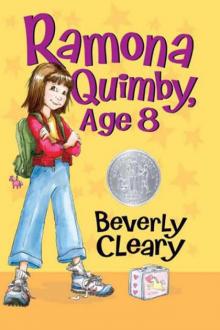 Ramona Quimby, Age 8
Ramona Quimby, Age 8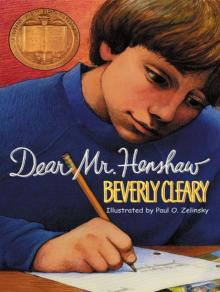 Dear Mr. Henshaw
Dear Mr. Henshaw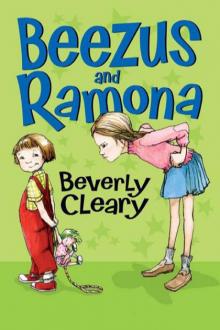 Beezus and Ramona
Beezus and Ramona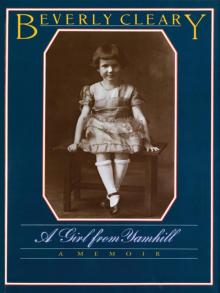 A Girl from Yamhill
A Girl from Yamhill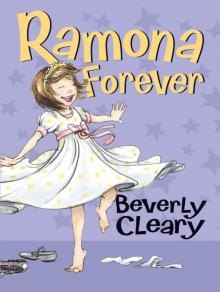 Ramona Forever
Ramona Forever Jean and Johnny
Jean and Johnny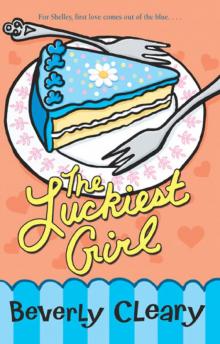 The Luckiest Girl
The Luckiest Girl Emily's Runaway Imagination
Emily's Runaway Imagination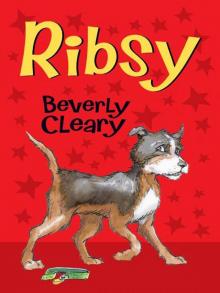 Ribsy
Ribsy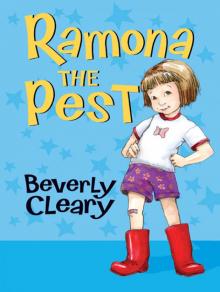 Ramona the Pest
Ramona the Pest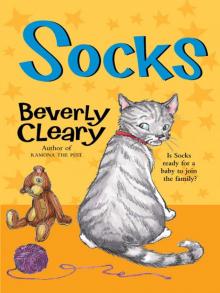 Socks
Socks Ramona's World
Ramona's World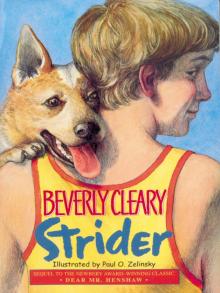 Strider
Strider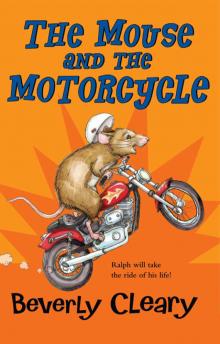 The Mouse and the Motorcycle
The Mouse and the Motorcycle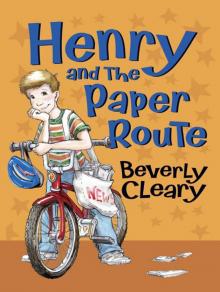 Henry and the Paper Route
Henry and the Paper Route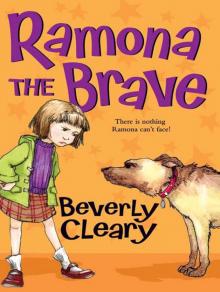 Ramona the Brave
Ramona the Brave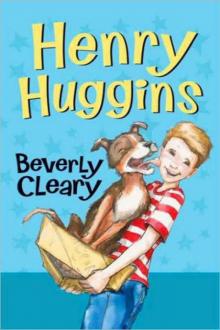 Henry Huggins
Henry Huggins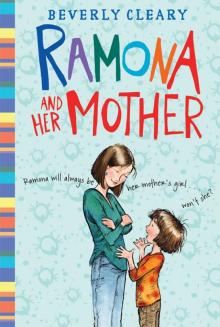 Ramona and Her Mother
Ramona and Her Mother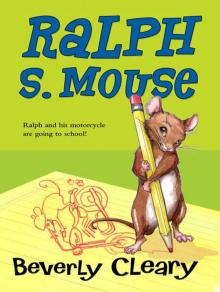 Ralph S. Mouse
Ralph S. Mouse Sister of the Bride
Sister of the Bride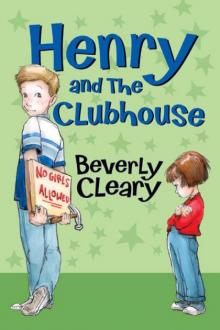 Henry and the Clubhouse
Henry and the Clubhouse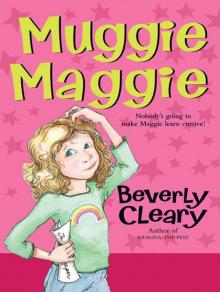 Muggie Maggie
Muggie Maggie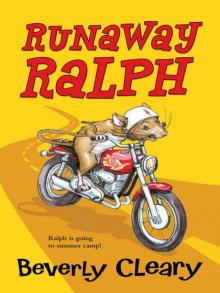 Runaway Ralph
Runaway Ralph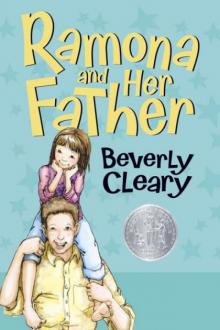 Ramona and Her Father
Ramona and Her Father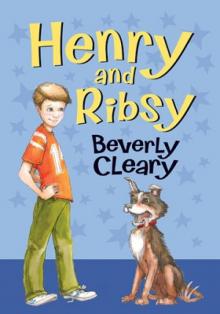 Henry and Ribsy
Henry and Ribsy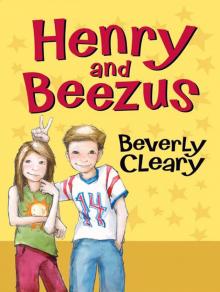 Henry and Beezus
Henry and Beezus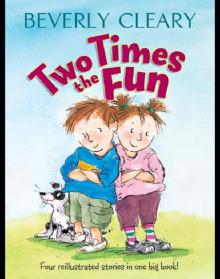 Two Times the Fun
Two Times the Fun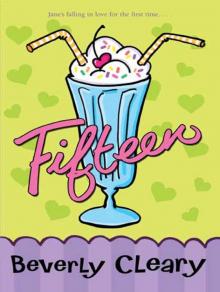 Fifteen
Fifteen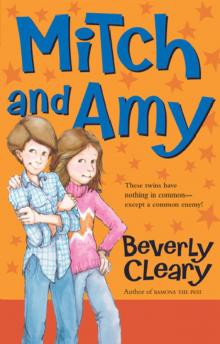 Mitch and Amy
Mitch and Amy